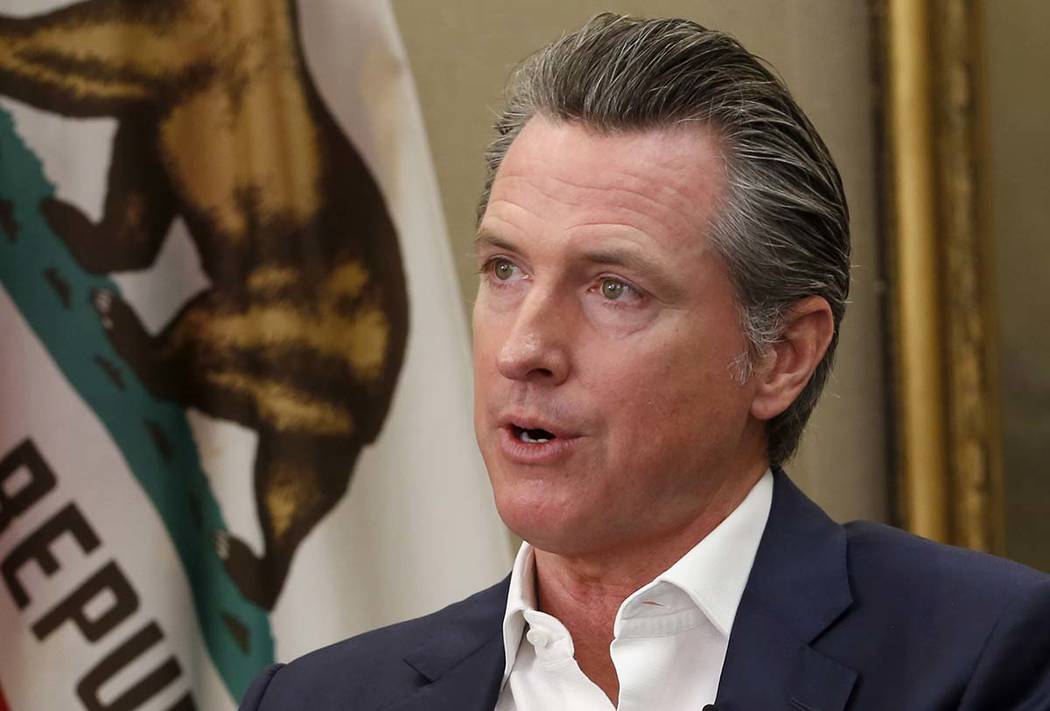California adopts broadest US rules for seizing guns
SACRAMENTO, Calif. — California Gov. Gavin Newsom on Friday signed a law that will make the state the first to allow employers, co-workers and teachers to seek gun violence restraining orders against other people.
The bill was vetoed twice by former governor Jerry Brown, a Democrat, and goes beyond a measure that he signed allowing only law enforcement officers and immediate family members to ask judges to temporarily take away peoples’ guns when they are deemed a danger to themselves or others.
They were among 15 gun-related laws Newsom approved as the state strengthens what the Brady Campaign to Prevent Gun Violence calls the nation’s toughest restrictions.
“California has outperformed the rest of the nation, because of our gun safety laws, in reducing the gun murder rate substantially compared to the national reduction,” Newsom said as he signed the measures surrounded by state lawmakers. “No state does it as well or comprehensively as the state of California, and we still have a long way to go.”
Between 1993 and 2017, the latest available, there was a 62% decline in the gun murder rate in California, nearly double the 34% nationally, he said.
‘Tweaks to policies’
Brady Campaign spokeswoman Amanda Wilcox, who lost her 19-year-old daughter to gun violence in 2001, said that California’s laws are already so strict that the latest bills amount to “tweaks to policies already in place, ways to improve implementation” of existing limits.
Seventeen states and the District of Columbia have laws similar to California’s current restraining order law, but the new law that takes effect on Jan. 1 will be broader.
“With school and workplace shootings on the rise, it’s common sense to give the people we see every day the power to intervene and prevent tragedies,” said the bill’s author, Democratic Assemblyman Phil Ting of San Francisco. The existing law has mostly been used by police officers, but Ting said the expansion should allow more awareness and more opportunity for others to act.
Newsom is also a Democrat and signed a companion bill allowing the gun violence restraining orders to last one and five years, although the gun owners could petition to end those restrictions earlier.
Hawaii allows the restraining order petitions by medical professionals, co-workers, and educators but not employers, Ting’s office said. It cited information from the Brady Campaign Against Gun Violence and the Coalition to Stop Gun Violence.
Maryland allows the restraining order petitions by health care providers and Washington, D.C., allows mental health providers to petition, while New York allows them from school administrators.
Sworn statements needed
The California law will require co-workers requesting the orders to have “substantial and regular interactions” with gun owners to seek the orders and co-workers and school employees must get approval from their employers or school administrators before seeking them. People seeking the orders will have to file sworn statements specifying their reasons for doing so.
The measure was opposed by gun owners’ rights groups and the American Civil Liberties Union. The ACLU said the bill “poses a significant threat to civil liberties” because orders can be sought before gun owners have an opportunity to contest the requests.
Those allowed to request orders under the new law may “lack the relationship or skills required to make an appropriate assessment,” the ACLU said.
Ting cited a recent study finding that gun restraining order laws may have helped prevent 21 mass shootings, though the University of California, Davis, researchers cautioned that “it is impossible to know whether violence would have occurred.”
The companion bill was authored by Democratic Assemblywoman Jacqui Irwin of Thousand Oaks, who cited last year’s slaying of a dozen people at the Borderline Bar and Grill in her Southern California community of Thousand Oaks.
Search warrants at same time
Aside from extending the restraining orders to a maximum of five years, her bill allows judges to issue search warrants at the same time as they grant the orders. The warrants can be used immediately if the gun owners are served with the relinquishment orders but fail to turn over the firearms or ammunition.
Irwin also authored related legislation requiring law enforcement agencies to develop written policies and standards for seeking gun violence restraining orders.
Ting also has a companion bill that would allow gun owners starting next September who are the subjects of restraining order requests to file a form with the court saying they won’t contest the requests and are surrendering their firearms. Under current law, even those who agree to give up their guns must go through a court hearing, which Ting says wastes time and resources.
A final related bill by Democratic Assemblywoman Sabrina Cervantes of Riverside makes people subject to restraining orders in other states to the same restrictions in California.

















